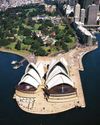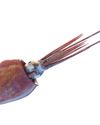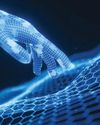
Hydroelectric power meets around 15 per cent of the world’s electricity needs, supplying about a billion people with power – that’s comparable to 3.6 billon barrels of oil. The importance of hydropower will grow over the coming decade, with a huge number of major schemes currently under construction – as of February 2024, there are at least five in China alone. It means that although our reliance on fossil fuels is still significant – it’s a hard addiction to crack, after all – hydropower is helping us decrease our dependence.
Power production is simply a process of converting energy from one form to another. In hydroelectric plants, it’s the ‘potential energy’ of water collected in a dam that eventually ends up as electricity. A pipe known as a penstock runs through the base of the dam. As water rushes through, the potential energy becomes kinetic energy – the energy of motion. This kinetic energy rotates a turbine in the penstock.
The turbine leads to a shaft that in turn leads to a generator. Inside the generator, huge magnets start to rotate past copper coils to produce alternating current (AC) electricity.
Finally, this is changed to a higher voltage using a transformer and delivered to the power grid.
Although initial construction is expensive, once up and running, hydroelectric generators are cheap to run, produce zero waste and don’t generate any pollution. There are over 1,500 hydroelectric power plants in use in the US alone, making it the country’s largest renewable energy source. One such plant is located on the Hoover Dam, spanning the Colorado River on the border between Arizona and Nevada. When the dam was completed in 1936, it supplied Las Vegas with the majority of its electricity, though the city has since expanded and now has to get energy from other sources as well.
この記事は How It Works UK の Issue 195 版に掲載されています。
7 日間の Magzter GOLD 無料トライアルを開始して、何千もの厳選されたプレミアム ストーリー、9,000 以上の雑誌や新聞にアクセスしてください。
すでに購読者です ? サインイン
この記事は How It Works UK の Issue 195 版に掲載されています。
7 日間の Magzter GOLD 無料トライアルを開始して、何千もの厳選されたプレミアム ストーリー、9,000 以上の雑誌や新聞にアクセスしてください。
すでに購読者です? サインイン

INCREDIBLE SOLAR SYSTEM CRATERS
Why these spectacular craters carved out by past impact events are among the most widespread and distinctive geological features in the Solar System

HOW NORTH AMERICA'S GREAT LAKES FORMED
The world's largest freshwater system comprises five immense interconnected lakes, carved into Earth by glaciers

BUILDING THE WORLD'S DEEPEST CAR PARK
Australia's most famous landmark is often marvelled at from ground level, but its innovative spiral substructure is a hidden gem

FINDING THE COLOSSAL SQUID
This elusive creature spawned a legend of a deep-sea monster that endured for centuries

Octopuses burn more calories changing colour than you do on a 23 minute run
For octopuses, changing colour burns about as many calories as a human on a 23-minute run. Octopuses are masters of disguise, changing colour at the drop of a hat to startle predators and hide from prey.
The world's first silicon-anode battery could revolutionise electronic vehicles
A ceramic battery manufacturer has unveiled a solid-state battery concept that can be charged from 5 to 60 per cent capacity in just five minutes, giving future electric vehicles (EVS) a 186-mile range in the time it takes to order a coffee.

New technology gives AI the power to feel surfaces
Scientists have given artificial intelligence (AI) the capacity to 'feel' surfaces for the first time, opening up a new dimension for deploying the technology in the real world.

Visit Plane Earth 2125
How might our world have transformed under the strain of climate change 100 years from now?

The world's largest organism may have been growing for 80,000 years
Pando, an enormous quaking aspen that spans more than 40 hectares in Utah, is not only one of the largest known organisms on Earth, it's also one of the oldest.

Scientists detect the most powerful cosmic rays ever
Scientists have detected the most energetic cosmic rays ever discovered, and they're being produced by mysterious sources relatively close to Earth.